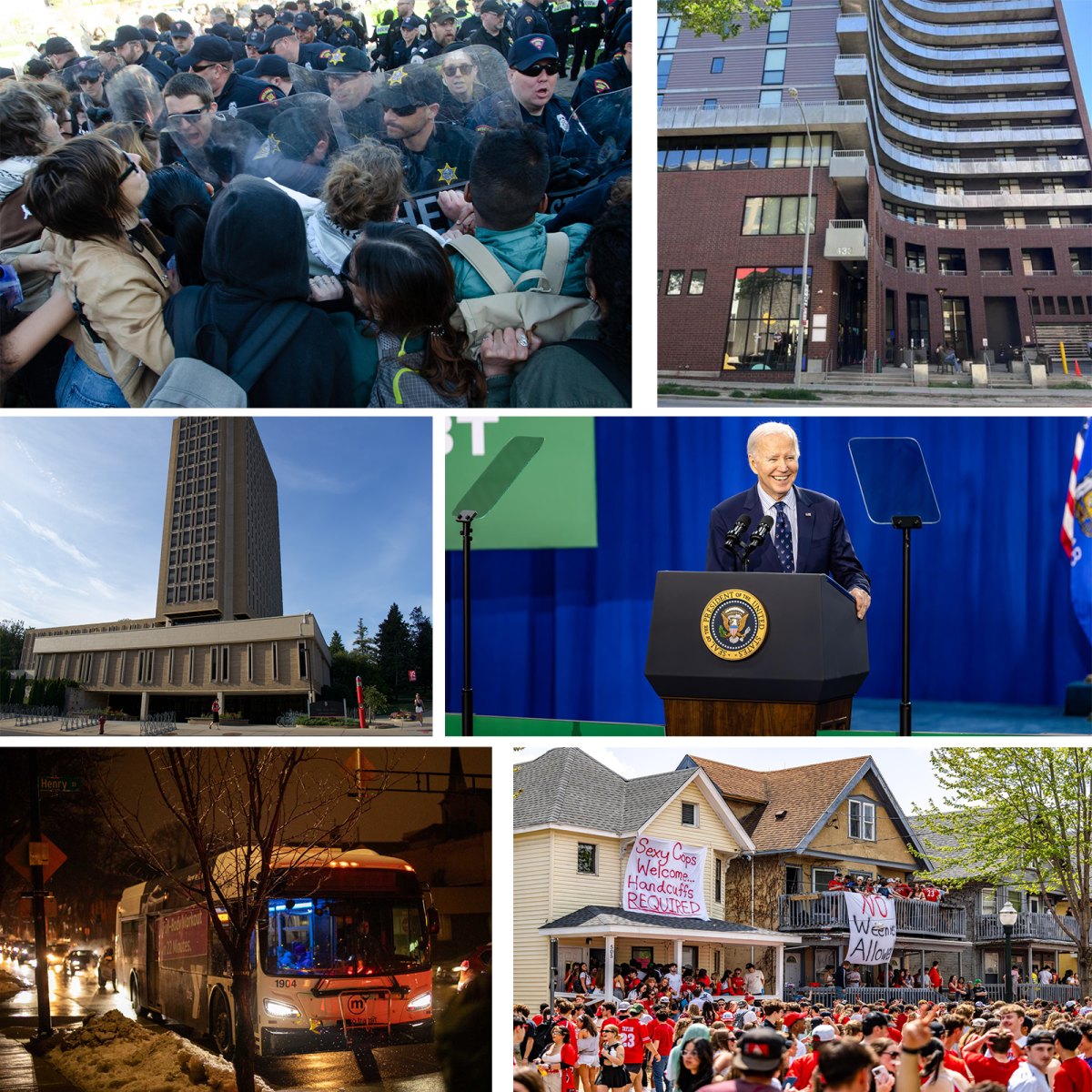Last spring, the University of Wisconsin campus and surrounding areas were companions to some of the biggest headlines. These stories were some of the most significant of the spring 2024 semester.
Campus
Pro-Palestine Activism, encampment on UW Campus
A nationwide movement swept college campuses across the nation in April in response to the war in Gaza. The movement came to UW April 29 when, over the course of 12 days, thousands of members of the student body, city and larger community established an encampment on Library Mall. Student organization Students for Justice in Palestine organized most of the protests, demanding the university disclose all UW Foundation investments, divestment from occupation, call for an immediate ceasefire in Gaza, reduce the police presence on campus and cut all ties with Israeli institutions.
The University of Wisconsin Police Department, the Wisconsin State Patrol and the Dane County Sheriff’s Office entered the encampment on its third day, making 34 arrests. In the preliminary hearings for arrested individuals, one officer testified a protester attempted to disarm him of his baton when the crowd pushed forward against the police.
After 12 days, University Administration and SJP reached an agreement which required the encampment be removed from Library Mall while further negotiations continued with SJP representatives toward their goals.
“Campus administration has repeatedly emphasized, and SJP representatives have acknowledged, campus administration’s limited authority over how our endowment is invested and whether investment decisions made by others are disclosed,” the agreement read.
University Administration and students must continue to work together and better understand each other, according to a statement from Chancellor Jennifer Mnookin released May 10.
An SJP member later spoke with The Badger Herald about the agreement with University Administration.
“We have learned the importance of keeping our university accountable to the broader community, both locally and internationally,” the member said.
Mifflin Street Block Party leads to arrests, ongoing investigation of car flip
The Mifflin Street Block Party — one of the largest college parties in the U.S. — comes every year at the end of the spring semester. The party is unsanctioned, and has repeatedly drawn controversy from the city and police force due to its reputation for arrests, alcohol use and property damage. The Madison Police Department reported the 2024 party was the largest since the pandemic.
MPD Central District Captain Michael Hanson said safety at the event is always a top priority.
“The biggest thing for this unsanctioned event is to ensure there’s safety for the officers and the people attending,” Hanson said.
Party attendees flipped a car in a backyard along Mifflin Street’s 500 block. A GoFundMe campaign was started to raise funds to replace the car and has raised over $7,500 since April. In May, MPD released 31 pictures of suspects, asking the community for help identifying them. The investigation is ongoing.
City
Downtown shooting at apartment rooftop
The Lux Apartment building was the site of a shooting June 9 where at least 10 people were injured. Police were initially called for a large rooftop party. When they arrived, there were reports of shots fired. Officers reported several hundred people on the rooftop when the shooting occurred and people running from the building.
MPD Chief Shon Barnes said it was a miracle that no one was seriously injured.
“Whenever there’s someone who fires a gun indiscriminately like this, there’s always a threat to the community,” Barnes said. “We’re going to work to ensure that whoever is responsible for this is brought to justice, but we can only do that with the help of our community.”
UW said in a statement that nobody involved with the shooting is known to be affiliated with the university, according to UWPD.
A suspect has since been arrested June 28 in relation to the shooting while the investigation is ongoing.
City of Madison to enhance infrastructure and transport systems
The U.S. Department of Transportation’s Federal Transit Administration released a statement March 11 claiming $118.1 million has been included in President Biden’s 2025 proposed budget for the Madison area’s second bus rapid transit line — Metro Rapid Route B. UW College of Engineering professor David Noyce stated that the federally funded project will lead to greater accessibility, fewer stops and control of traffic for improved efficiency.
“The BRT system is being designed for each part of the city including the South side where transit may not always be well served and providing access and mobility for people who need transit to get jobs or to get to the other parts of the city where they need to be,” Noyce said.
More bus rapid transit stations have undergone construction on State Street and around Capitol Square during spring 2024. The new station platforms will have 13.5 inch full lengths similar to subways with new overhead shelters and ticket vending machines, allowing riders to pay fares before the arrival of the bus.
All-electric buses will additionally be available during peak hours and on busy lines to serve more passengers. The estimated date for the completion of the BRT upgrade is sometime in the fall.
Along with local Metro, the city is also discussing plans for a future passenger train station on the Isthmus. The future passenger rail station would extend the Amtrak Hiawatha service which currently connects Milwaukee and Chicago — other considered stops are between Eau Claire and the Twin Cities area. Potential locations for the station are the First Street corridor and Oscar Mayer corridor areas, City of Madison Transportation Planner Elizabeth Callin said. The City of Madison hopes to share plans soon this summer and have the train ready for service by 2031.
State Street recently underwent a makeover as the lower road section was fully converted to a pedestrian mall. The goal of the project is to encourage more planned activities and local entertainment in the iconic area according to Madison’s Central Business Improvement District Executive Director Matt Tramel.
“We really want to create a unique and engaging experience for the pedestrians on State Street,” Tramel said. “We want to encourage people who don’t often come downtown to come back downtown again and again.”
State
UW System debt to increase, campus closures across state
The University of Wisconsin System has more than 160,000 students enrolled each year at 13 main campuses across the state, with an additional 11 branch campuses. Seven schools in the system are amassing debt. Green Bay, Oshkosh, Parkside, Platteville, River Falls, Superior and Whitewater will be $254.9 million in debt by the end of the 2028 fiscal year, according to the UW System 2023–28 Strategic Plan.
Due to this financial instability, many two-year branch campuses have closed, such as UW-Milwaukee’s Washington County campus and UW-Oshkosh’s in Fond du Lac. Along with closures, major campuses such as UW-Oshkosh are undergoing layoffs and workforce cuts, as they laid off 200 employees last October — the UW-Oshkosh Chancellor citing “challenging financial positions.”
“The closure of these two-year campuses is going to hit these communities very hard — not just now with the obvious loss of jobs and revenue — but long into the future when those educational opportunities have dried up for young people,” UW System President Jay Rothman said.
On April 12, Governor Tony Evers released a statement claiming that UW’s financial troubles were due to the insufficient funding from the Wisconsin State Legislature. On March 6, Gov. Evers reached bi-partisan support for funding for UW projects — the new Engineering building on the UW campus. Funding for the UW-System and raises for UW staff was froze in the Legislature for a period of time due to republican backed disagreements with DEI programs and staffing.
As enrollment numbers decline at other satellite campuses, the probability of additional staff cuts and restructuring may increase. Flagships such as UW will continue to grow their student populations and campus with government funding and tuition raises.
Biden speaks in Madison on student loan debt relief
President Joe Biden arrived at Madison College to speak April 8. His main points surrounded unveiling his new plan for widespread debt relief among college student loans. The action plan would cancel up to 20,000 in interest for borrowers, and also cancel debt for people who may be eligible for other plans such as the Saving on a Valuable Education Plan (SAVE).
“How can we be the leading country in the world without the best education system and access to it?” Biden said.
Biden said he plans to cancel undergraduate and graduate loan debt for those who entered repayment at least 20 and 25 years ago, respectively. Another step in his plan will cancel debt for borrowers experiencing financial hardships, like struggles with childcare or healthcare.
“That’s what this is all about … give everybody a fair shot, just a shot, the freedom to chase their dreams,” Biden said.
Biden returned to Madison July 5 at Sherwood Middle School after his June 27 debate against former president Donald Trump. He took time to address criticisms about his age and recent debate performance saying he would remain in the race.
“I’m not letting one 90-minute debate wipe out three and a half years of work,” Biden said. “I and you are not finished yet.”



